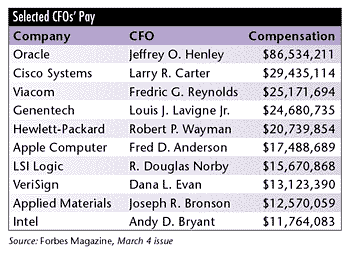Studies have shown that people in developed nations will pay as much as 30 percent more for quality products and
services. Why is that? It's because people today look at perceived value, which includes factors other than just price. People pay based upon the services provided, the quality and dependability
of those services, and how much the services contribute to their individual or organizational well-being. We pay based upon these products' perceived value compared to the
competing products' perceived value. In fact, we often make the decision to buy or not based on perceived value alone. Since my retirement from Systemcorp, I've been deluged
with offers, everything from CEO of organizations to project manager to director of quality opportunities. The lowest salary and stock options, I've noticed, are always attached to the director
of quality positions. I would expect a CEO to be paid more than a director of quality, but I'm surprised that project managers are paid more.  A look at Quality Digest's salary survey for quality professionals is shocking. Few
quality positions garner more than $150,000 per year. At Systemcorp, an average salesperson who met quota was paid more than that, and an outstanding one could top $300,000 per year. A look at Quality Digest's salary survey for quality professionals is shocking. Few
quality positions garner more than $150,000 per year. At Systemcorp, an average salesperson who met quota was paid more than that, and an outstanding one could top $300,000 per year.
If quality is more important than cost, why do organizations' quality leaders earn much less than the CFOs? Why is it that a CFO's value figures in the tens
of millions but a vice president of quality is worth about $200,000, max? Can it really be that an organization's financial side is 100 times more important and
valuable than the quality of its products and services? Professor Yoshio Kondo, chairman of the International Academy for Quality,
points out that the quality profession existed long before the financial one. Yet the former remains overlooked.
A corporate charter requires that a treasurer be identified but not a quality manager. The criteria for becoming a CPA is well-established and accepted
throughout the United States, and many firms require their key financial people to be CPAs. But few CEOs know that a quality engineering certification exists,
and fewer organizations require their quality engineers to be certified. Public corporations are required by law to have their financial reports audited by an
independent auditor, but the same isn't true for their quality reports. Finance is a required course in every MBA program, but quality isn't. California is the
only state that licenses quality engineers as professional engineers; quality methodology simply isn't accepted as a bona fide profession in major organizations.
For example, when IBM decided to assign a corporate vice president of quality, it assigned a division head who had never worked in the quality field
rather than one of the quality project managers. After all, quality is defined by the customer, and because everyone can be a customer, anyone can handle a
quality assignment. This is disastrous thinking. The thing I like most about Six Sigma is the educational process an individual
must complete to be called a Black Belt. When Jack Welch suggested that Black Belts were a key success factor for GE, it suddenly became fashionable
to select key individuals and train them in quality functions. The quality engineer fell out of fashion during the 1980s but came back during the 1990s as a Black
Belt. The pendulum is swinging back; Black Belts, Six Sigma and ISO 9000 have started the quality profession on a recovery cycle.
We need to upgrade the quality engineering certification's importance in COOs' and CEOs' minds. The top quality position should be upgraded to
CQO. Many of you may disagree, believing that the CQO is the CEO, but if that's true, then the CEO should also be the CFO. Candidates for CQO
assignments should at least be certified as quality engineers and quality managers. Organizations such as the American Society for Quality, the European
Organization for Quality, the Asian-Pacific Quality Organization and the International Academy for Quality need to accept the challenge of establishing
the quality profession on an equal footing with the financial profession. It's only through their combined efforts that this monumental task can be accomplished. About the author H. James Harrington has more than 45 years of experience as a quality
professional and is the author of 20 books. E-mail him at jharrington@qualitydigest.com . Visit his Web site at www.hjharrington.com . E-mail letters to the editor about this column to letters@qualitydigest.com . |